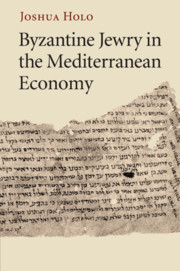Book contents
- Frontmatter
- Contents
- Acknowledgments
- List of abbreviations
- 1 Byzantine-Jewish economic history
- 2 Byzantine Jews throughout the Mediterranean: fluidity and exchange
- 3 The inner economy of the Jewish communities
- 4 The integrated Jewish economy
- 5 Byzantine-Jewish trade in the Commercial Revolution
- 6 Conclusion: a new perspective on Byzantine economic history
- Appendix A MS translations
- Appendix B MS images
- Sources consulted
- Index
6 - Conclusion: a new perspective on Byzantine economic history
Published online by Cambridge University Press: 29 March 2010
- Frontmatter
- Contents
- Acknowledgments
- List of abbreviations
- 1 Byzantine-Jewish economic history
- 2 Byzantine Jews throughout the Mediterranean: fluidity and exchange
- 3 The inner economy of the Jewish communities
- 4 The integrated Jewish economy
- 5 Byzantine-Jewish trade in the Commercial Revolution
- 6 Conclusion: a new perspective on Byzantine economic history
- Appendix A MS translations
- Appendix B MS images
- Sources consulted
- Index
Summary
It cannot be said of Byzantine Jewry that it brought the greatest of influences to bear in the Mediterranean world; nor can it be said, however, that the experience of this community and the force of its presence are accurately reflected in the comparatively few and widely dispersed sources. One can only gauge the impact of this small community, less than one percent of the population of the Byzantine Empire, by extrapolating a larger picture from the assemblage of documents, chronicles, epitaphs, religious literature, responsa and legal compilations that constitute the currently known body of primary sources. And economic history, though only one of many possible approaches to the interpretation of this corpus, brings certain key aspects of the Byzantine-Jewish experience into stark relief, and, it is hoped, it serves an important function in the painting of that larger picture. In tracing the allocation of Byzantine-Jewish resources across languages, religious affiliations and countries, economic history helps to clarify this minority's place in the constellation of contemporary Jewish cultures, the Byzantine Empire and the eastern Mediterranean at large. Avoiding comparison to the more prolific and better-preserved cultures of Spain, Baghdad and continental Europe, this methodological point of departure allows us to admit a correlation between paucity of sources and relative cultural influence, without then deducing, in wholesale fashion, a lack of significance.
- Type
- Chapter
- Information
- Byzantine Jewry in the Mediterranean Economy , pp. 206 - 214Publisher: Cambridge University PressPrint publication year: 2009



